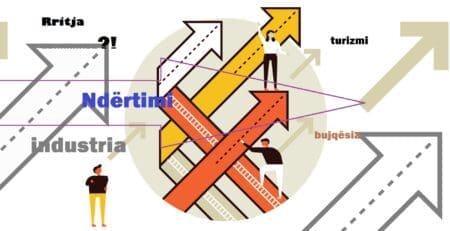The crisis and Us need to talk
The European economies with which Albania has relations are at risk of falling back into crisis, despite the measures they have been implementing for last 10 years. What makes a difference in the recurrence cycle of crises is the fact that they are not coming in the same way they are perceived from public opinion. The financial markets and economies of these countries are now undergoing situations adapted to the new developments of the global market, policies and financial system implemented by developed countries and powerful international corporations, as well as other reasons stemming from national domestic policies.
For Albania, this information is most valuable at the level of consideration of how it should adapt its approach to its economic, financial and monetary policies in order to capitalize on the weaknesses that are emerging in the most frequent market cycles that surround it by exploiting the gaps created by these situations. What should a small country like Albania (or Kosovo) do not lose, but take advantage in cases where it seems that they are not directly affected by the ill financial system of developed countries? In fact, there is no ready-made analysis to precede and come to terms with the evil that comes from the impact on our country’s economy and public finances. The answer that can be to this situation should be the least adaptation to the economic and political reality that has changed year after year.
Whereas, developed countries that partner with us suffer from investment restriction and economic expansion, countries with economies in structuring and attempting to absorb investment to enable consolidation of public finances and competitiveness of economy (Albania, Kosovo etc.) should first increase the share of revenues against GDP, and second and at the same time strengthen public investment by optimally utilizing public funds. In short, less investment means less overall demand in the economy, which justifies a lack of confidence and causes another round of belt tightening. The crisis is averted only when there is nothing more to cut in budget spending and capital expenditures need not be delayed further.
As part of planning an approach to tackle the impact of the next wave of the financial system crisis and European markets, it is very appropriate to go beyond defensive policies to strengthen the fight against informality and law enforcement alike for all understood as a comprehensive front. But not only that!
Just as every individual who owns capital seeks to protect them for a situation that could harm his or her family’s interests, so too should the government proceed with increased force to complete the initial and completed investment planned and curb planning with public funds beyond development investment. Once the most optimal decision-making in a time like this is coming up is the more frequent flow of money keeping under control the sense of abuse for the benefit of corruption. Thus, e.g. in a situation where the private market in the civil construction sector is at a higher supply than demand there is a need for monetary policy in favor of stimulating consumption to be coordinated with fiscal policy. The goal of helping an economy or consumer sector is starting to increase its market confidence.
In fact, when the fear of surrounding markets grows then it is necessary for the reaction of the internal market and economy to be on the brink of moving forward, as this is also the best period to overcome the problems that may arise, but also to prepare for a surge in external demand for skilled labor and a market that can expand beyond its shell. But it is not enough for everyone to express themselves in their position, and so it may be thought that something has been done to the benefit of the market and the public. Even advisors behind the decision makers are not enough.
Following a presentation of ideas (politics, government, experts, the public) a public discussion of experts in coordinated levels and formats is needed to help the discussion rather than individualize the discussion for personal interests. There is a great deal to be said about reshaping the companies that are still in the public and private sector on how to incorporate corporate governance models to compete with the managerial model. Competition further needs to be strengthened through coordination to work in a market where the goal is not to exclude the competitor at all costs, but to formalize certain segments as well as utilize capacities that have not yet been put into use.
In the meantime, much work needs to be done to create a transparent market with the same standards as those applied to capital markets in partner countries with Albania. After that, the market must begin to enter the international capital system, as only then does Albanian capitalism make sense and begin to become truly attractive to investors. These are the challenges we should not expect to happen, but to make them possible.




Leave a Reply
You must be logged in to post a comment.